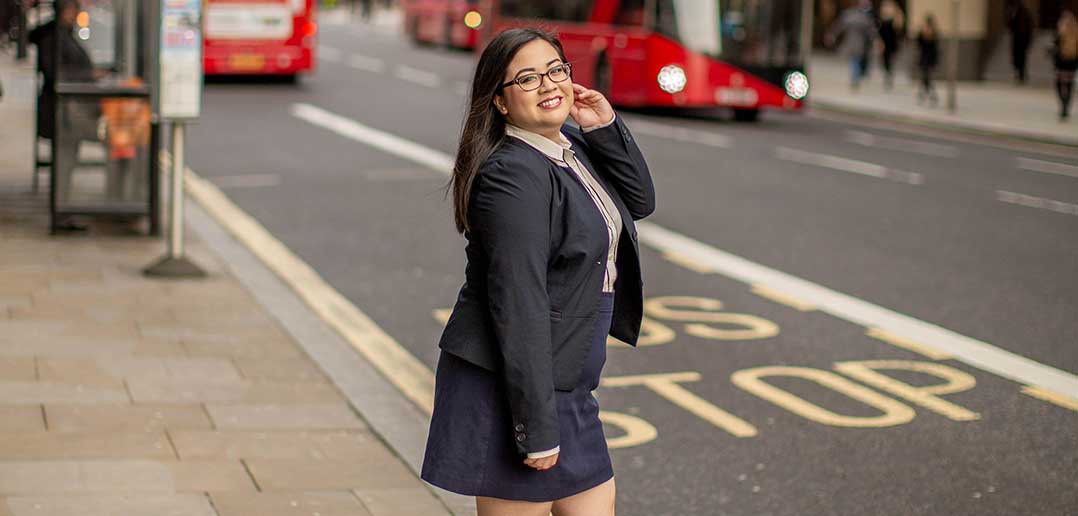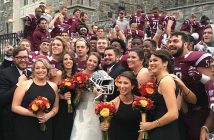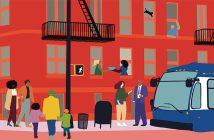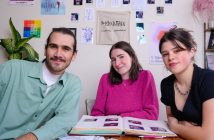“Professor Jeannine Hill Fletcher taught me that there are so many more dimensions to religion and theology than I originally thought, and that there is space for women in theology—an important message as a woman in theology myself,” she said.
She’s taken that lesson to heart: Ruiz, currently a student at the London School of Economics and Political Science (LSE), hopes to one day work at a nongovernmental organization, or in government, focusing specifically on creating policies that improve the lives of women.
A native of San Francisco, Ruiz majored in theology religious studies at Fordham with a concentration in faith and culture and a minor in American studies. She also served as a member of United Student Government at Lincoln Center; wrote for The Observer; was a member of the Phi Beta Kappa, Alpha Sigma Nu, Theta Alpha Kappa, and Phi Kappa Phi honor societies; and even received the 2021 Undergraduate Student Award for Most Active in Promoting Diversity and Inclusion from the Office for Student Involvement. She also completed internships with the National Development Council—a nonprofit that works with both government and community organizations to support and preserve “homes, jobs, and community”—and with Zina Spezakis’ campaign for Congress.What do you think you got at Fordham that you couldn’t have gotten elsewhere?
Here’s a story that I like to tell: I arrived at Fordham a characteristically nervous freshman, daunted by a new city and the prospect of making social connections. On my way to audition for a club, I realized that I had no idea how to print the script I needed for my audition. Frantically, I approached an upperclassman to ask for help. Not only did he sit with me to figure out how to set up my printing account, he used his own credit to help me print my script. This unprecedented gesture exemplified the kindness and care that defines the Fordham community.
Academically, Fordham teaches its students to be deeply informed and concerned about injustices in the world, but also deeply moved to do something about them. Across disciplines, Fordham professors teach students not only about important issues in our communities but inspire their students to make a difference.
What Fordham course has had the greatest influence on you and your career path so far? How and why was it so influential?
Major Developments in American Culture, taught by Professor Diane Detournay. From academic discourse to everyday news, we often throw around terms like “systemic inequality,” “injustice,” and “oppression,” but we don’t spend enough time unpacking why these things happen or how they came to be in the first place.
Professor Detournay’s class allowed us to home in on the history of our country’s unfair systems and the ways in which they are perpetuated or upheld. Some topics we focused on were immigration, the prison-industrial complex, and the colonial history of Hawaii. I came away from her class with the confidence to articulate the history and mechanism of unjust systems, which was fundamental to my decision to study social policy for my master’s degree. I figured that the best way to combat systemic injustice is to change the systems that cause them in the first place.
Who is the Fordham professor or person you admire the most, and why?
This is a tough question because there are so many professors and people at Fordham I admire. If I had to choose, I admire Professor Jeannine Hill Fletcher. Among my non-religious peers, I’ve noticed that there is a general perception that religious people lack an awareness of societal discrimination. While it’s not her stated mission, I think Professor Hill Fletcher—who is Catholic—turns all of those stereotypes on their head. Not only is she a feminist theologian by training: she is very involved with advocacy work, as she is an prominent voice for faculty rights, and she is a dedicated ally to students of color and LGBTQ students. As someone who came to Fordham grappling with religion and trying to understand it better, it was really influential to meet Professor Hill Fletcher and see the kind of work she does.
Did you have any internships or any other experiences, such as clubs, that helped put you on your current path? What were they, and how did they prepare you for what you’re doing now?
I served on United Student Government (USG) for three years, culminating with a successful campaign for president. While USG is not an exact simulation of how state governments work, I felt that through my role, I was able to understand what it means to be a leader and how to deal with difficult issues because I entered my term right as COVID-19 hit and in the wake of the George Floyd protests. With the challenge of a pandemic and amid conversations about racial justice and everyday life, I found myself in a multitude of conversations about how to give students the best, safest, and most just experience possible.
During these conversations, I learned to play to the strengths of different personalities and work styles as I led the Senate and executive board, and I learned how to negotiate with high-level University administrators. I feel that the communication and leadership skills I gained through my role as president will be crucial to my future career in policy work, either as a government policy adviser or at an NGO.
Finally, as president, I accomplished several landmark projects that were the first of their kind at Fordham. They included Fordham’s first anti-discrimination policy for student organizations, Fordham’s first ceremony of recognition for first-generation students, and statements of support for Black, Burmese, and Asian American communities. While they were not policies in a public or social policy sense, these long-term projects trained me to see large plans come to fruition and to uplift a diversity of voices in respectful ways.
What are you doing now? Can you paint us a picture of your current responsibilities? What do you hope to accomplish, personally or professionally?
I am currently at the London School of Economics, pursuing my MSc in international social and public policy. I am continuing my passion for leadership by serving as a Student Academic Representative for my programme at LSE. After graduation, I plan to either pursue a Ph.D. or begin my career in public policy.
What are you optimistic about?
While I miss Fordham dearly, knowing that it is inspiring generation after generation of changemakers makes me optimistic.
Interview conducted, edited, and condensed by Sierra McCleary-Harris.



